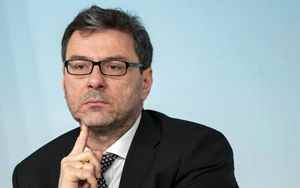(Finance) – It is important for the European Union to have “a more incisive common energy policy and strategy”. This is the message launched by Economy Minister Giancarlo Giorgetti from Berlin where today he met the German Finance Minister Christian Lindner.
Giorgetti’s visit to Berlin is the first foreign mission of the new Italian government. “At the center of the talks – explains the Mef in a note – the problems of the respective countries in relation to the consequences on households and businesses of the increase in energy costs “.
Giorgetti, after having recalled “the importance of good relations between Italy and Germany” also by virtue of the numerous common economic interests, he underlined – highlights the ministry – that “the slowdown in the economy and the trend of inflation represent the emergencies that European governments must face “.
The meeting also allowed to deepen the last measures of the German government, illustrated by Lindner, to counter the increases in energy prices. Giorgetti highlighted the importance of the EU having a more incisive common energy policy and strategy.
“We believe it is a very positive sign that Minister Giancarlo Giorgetti is making his first visit abroad in Germany – commented Lindner shortly before meeting the Italian Minister of Economy in Berlin -. We have a very strong interest in a constructive dialogue with Italy and Giorgetti is one of the most experienced members of the Italian government “.
With Germany more isolated than usual in Europe, dialogue with Italy takes on new importance. Berlin wants to explain the new ones German measures against expensive energy, those related to the 200 billion euro bazooka that European partners do not like. The government of Olaf Scholz points to a brake on the price of gas. Already in December the German executive will take care of the gas bills of individuals and small businesses, as a bridging solution to the insertion of the real brakes, which will come into force from January 2023 for large companies and from March 2023 (or perhaps as early as February) for families and small-medium enterprises. For the big companies, almost 25 thousand (and for all hospitals in Germany) a gas price is expected to be blocked at 7 net cents per kilowatt hour for 70% of basic consumption (calculated with respect to a historical consumption history). For private individuals and SMEs a fixed price of 12 gross cents per kilowatt hour is expected for 80% of basic consumption. In both cases, the remaining consumption will instead be paid at market price: a mechanism that should theoretically also favor energy saving. A similar one is also expected from January 2023 brake on electricity prices: for industries 70% of basic consumption at 13 cents net per kilowatt hour and for private homes 80% of basic consumption frozen at 40 cents gross per kilowatt hour. The aid will be active until April 2024. Germany, for years dependent on low-cost Russian gas, now foresees the arrival of a recession and considers these state interventions as vital to keep its production structures and social peace intact. in the country. In the EU, however, the solution does not appeal very much, because other states, much more indebted, cannot resort to billionaire support by creating new debt. And the companies of these states could be much more in difficulty without European solutions that are, in fact, more common. The issue is shaking the Franco-German axis. Just next week, Monday November 7th, Giorgetti will meet in Brussels, among others, the French colleague, Bruno Le Maire for the debut at the Eurogroup, the coordination of the finance ministers of the 19 euro countries, the new minister of the economy. During the proceedings, the minister will also be invited to speak about the political priorities of the new Italian government, according to standard practice in the Eurogroup when a new executive takes office. The next day Giorgetti should therefore participate in the EU finance ministers’ council (Ecofin).
L‘Eurogroup, based on the provisional agenda, it will open on Monday afternoon with a discussion on the latest economic developments and prospects for the eurozone, based on the presentation to be made by the Commission and the European Central Bank. A session on fiscal policies in the euro area, with a general exchange between ministers on the basis of the framework that is emerging with the draft budget presented by the Member States, on the basis of the presentation that the Commission will give, and an expected reflection on the future of the coordination of budgetary policies in the euro area. An update on the measures to mitigate the impact of high energy prices, after the tour of horizons already at the meeting on 3 October. Eurozone finance ministers should therefore update themselves on the Banking Union, with the usual presence also of Chairman of the ECB Banking Supervisory Board Andrea Enria and of chairman of the Single Resolution Board Elke Koenig.
Among the different themes on the Ecofin table on Tuesday there will be the implementation of the Basel rules for the EU banking system, the financial impact of the war in Ukraine, a point on the implementation of the NRPs, and on financial services legislation.
